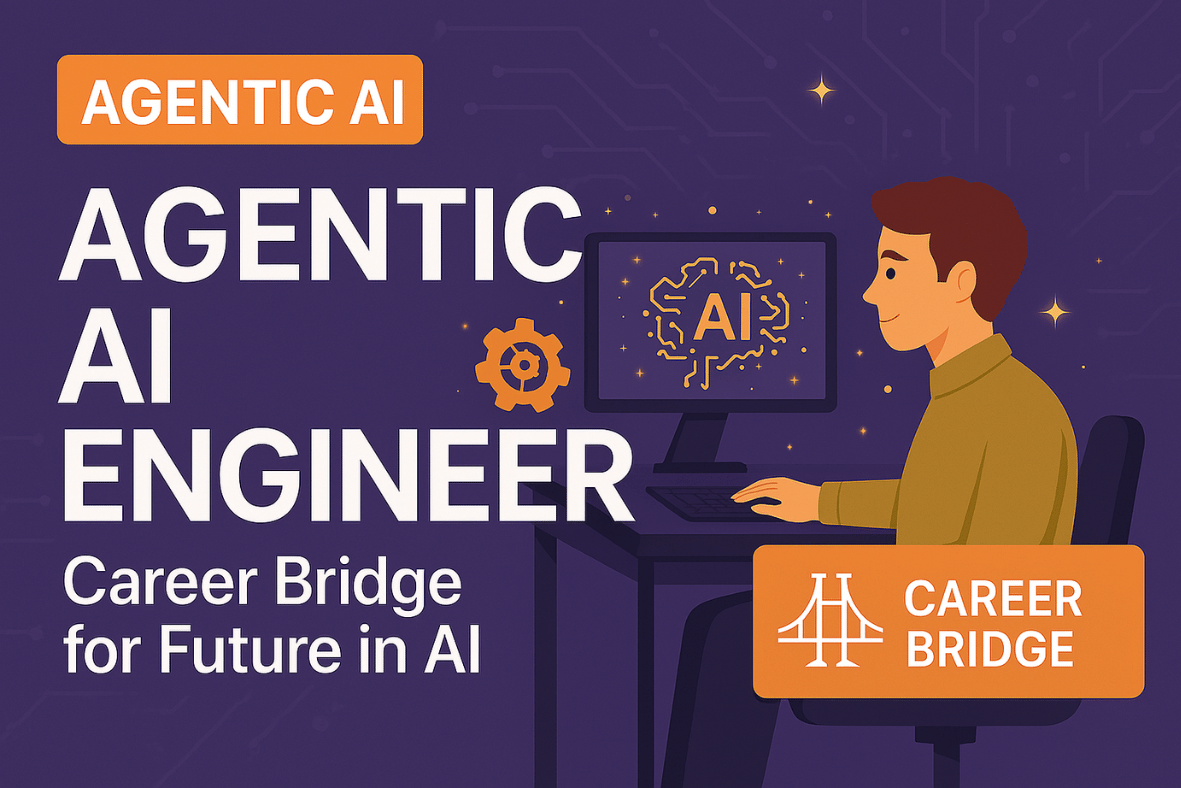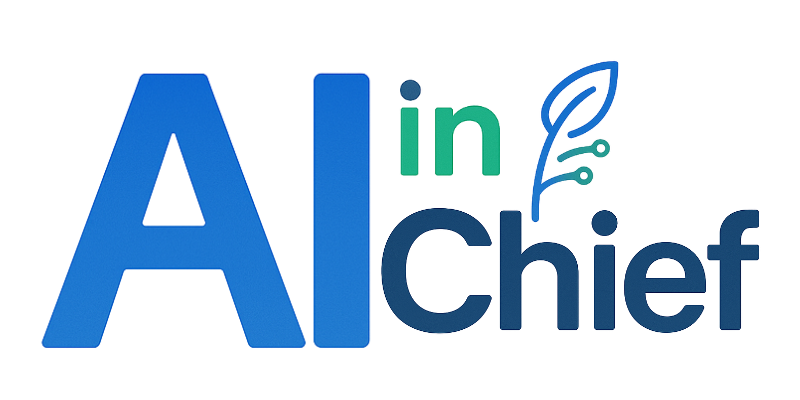Agentic AI Engineer's Career Bridge for Future in AI
At the heart of this evolution is a new role-Agentic AI Engineer-tasked with designing intelligent systems . If you’ve ever been fascinated by AI agents that schedule meetings, debug code, analyze data, or even simulate thought processes-this article is your launchpad.

A Successful Agentic AI Engineer
A successful Agentic AI Engineer doesn’t just build models-they orchestrate intelligent workflows.
They build multi-step, autonomous agents that use language models, planning systems, memory, tools, APIs, and environments to achieve complex goals. Think of them as architects of intelligence - merging software engineering, ML, and systems design to create thinking software.
They’re the minds behind AI copilots, autonomous assistants, AI research agents, and decision-support systems.
What You Will Learn
This career blueprint covers:
- The role and vision of an Agentic AI Engineer
- Required skillsets, capabilities, and tools
- Resume-building keywords and interview prep
- Fast-track preparation strategies for any timeline
- How to start- even without formal experience
Why This Role Matters in the AI Future
AI agents will power everything from enterprise workflows to robotics, personal productivity tools to autonomous simulations. With advancements like GPT-4, ReAct, AutoGPT, and OpenAgents, we’re entering a phase where AI doesn’t just respond- it acts.
This is more than engineering- it’s orchestration.
Agentic AI Engineers will be core contributors to:
- Autonomous business systems (marketing, ops, sales)
- Enterprise copilots with memory, reasoning, and context-awareness
- Simulation-driven environments for testing and planning
- AI that thinks, learns, and adapts - all in real time
Key Success Factors for Agentic AI Engineers
✅ Strong grounding in LLMs, tool usage, and orchestration
✅ Knowledge of agent frameworks (LangGraph, AutoGen, CrewAI, OpenAgents)
✅ Ability to integrate memory, planning, feedback, and tool-calling into workflows
✅ Deep programming skills - especially in Python
✅ Thinking in systems: flow diagrams, async processing, APIs
✅ Creativity to build novel agentic workflows and evaluate them effectively
Key Responsibilities of Agentic AI Engineers
- Design multi-agent architectures with capabilities like planning, reasoning, and memory
- Build task-solving agents with language models and structured tools (e.g., APIs, databases, search engines)
- Implement agent loops (ReAct, Plan-and-Execute, Tree of Thought)
- Integrate tools (web browsing, code execution, file management) into LLM-powered workflows
- Optimize agent performance (latency, token usage, reliability)
- Conduct real-world testing and simulate failures to harden agents
- Collaborate with UX, product, and ML teams to embed agents into customer-facing products
Capabilities Required for the Role
🧠 Technical Know-how:
- Proficiency in Python, async programming, and API development
- Deep understanding of LLMs (prompting, fine-tuning, inference APIs)
- System design principles and experience working with DAGs or event-driven systems
- Knowledge of memory management (vector stores, context windows)
- Experience with reasoning algorithms, planning strategies, and tool integration
🌐 Frameworks & Libraries:
- LangChain, LangGraph, CrewAI, OpenAgents
- FAISS, ChromaDB, Weaviate
- OpenAI, Hugging Face, Claude, Mistral
- Streamlit, FastAPI, Flask for building UIs and APIs
Top Tools to Learn and Crack the Interview of Agentic AI Engineer
🧰 Agent Frameworks:
- LangGraph – state machine orchestration for agents
- AutoGen – multi-agent collaboration engine
- CrewAI – roles, tasks, memory, and multi-agent coordination
- OpenAgents – production-grade agent toolkit
🔧 Enablers:
- FAISS / Chroma / Weaviate (vector DBs for memory)
- OpenAI Tool Usage, ReAct, CoT prompting
- Open Source LLMs: Mistral, Mixtral, Phi, Gemma
- FastAPI, Docker, and Celery for backend integration
Top Keywords for Your Resume (and LinkedIn)
- Autonomous AI Agent Design
- Agentic Frameworks: LangGraph, AutoGen, CrewAI
- Tool Integration & Prompt Engineering
- Multi-Agent Collaboration Systems
- ReAct / CoT / Plan-and-Execute Workflows
- LLM Orchestration & Reasoning Pipelines
- Vector Memory + RAG Integration
- Python Async Systems & Event Loops
- Context-Aware Agent Design
- Human-in-the-Loop Agent Optimization
💡 Bonus Tip: Include impact. “Built autonomous data research agent using LangGraph and OpenAI, reducing manual effort by 80%.”
Don’t Have the Experience? Do an Internship With Us.
🚀 Start small. Start today.
Apply to our Agentic AI Internship Program where you’ll:
- Build real-world agent workflows
- Work with top mentors & peers
- Deploy your work to real users
- Add serious projects to your GitHub & resume
👉 No experience? No problem. We'll train you.
If You Had Only 1 Hour to Prepare for an Agentic AI Engineer Interview
⚡️ Focus your prep like this:
- Be able to explain ReAct prompting and how it powers agent loops
- Review 1 open-source agentic project (e.g., AutoGen)
- Know how LangGraph or CrewAI handles multi-agent collaboration
- Prepare a short explanation of a project where an agent made decisions, used tools, or managed memory
- Understand what "tool-calling", "observations", and "next actions" mean in agent flows
Prepare for It: 1 Day, 1 Week, 4 Weeks
✅ 1 Day Plan
- Study LangGraph & AutoGen repo examples
- Watch one YouTube breakdown of autonomous agents
- Diagram a simple ReAct agent + be ready to explain it
- Prep one project to talk through
✅ 1 Week Plan
- Build 1 LangGraph agent with memory + a tool (e.g., Google Search)
- Clone and experiment with an AutoGen use case
- Test and break your agent-learn from the debugging
- Prepare for 3 mock interviews (1 tech, 1 design, 1 resume)
✅ 4 Week Mastery
- Complete a mini-capstone: e.g., AI research agent, email assistant, PDF analyzer
- Learn by contributing to open-source agentic repos
- Add vector memory + RAG to your agent
- Learn advanced prompting (Plan-and-Execute, Tree-of-Thoughts)
- Deploy your agent as an API or web app (FastAPI + Streamlit)
The Agentic AI Engineer is the coder-philosopher of tomorrow- one who doesn’t just solve problems, but designs AI that thinks, reasons, and acts.
Whether you're pivoting from ML engineering, full-stack dev, or just starting out-this is your bridge to the future of AI. Now’s the time to cross it.

